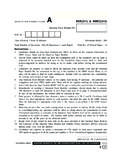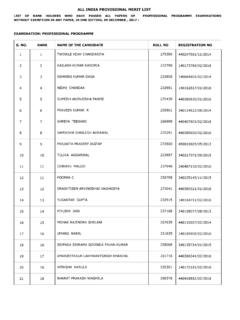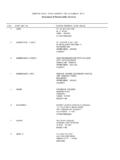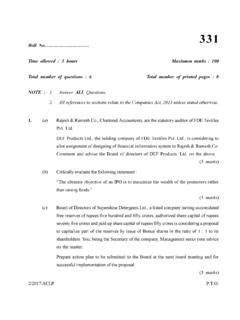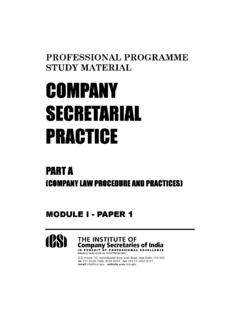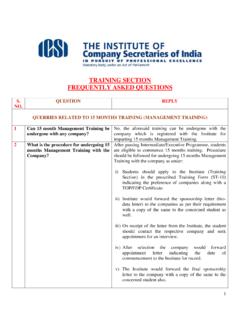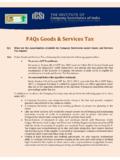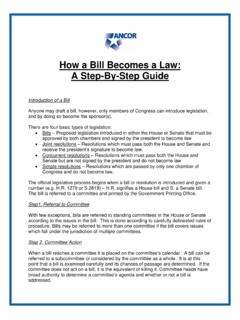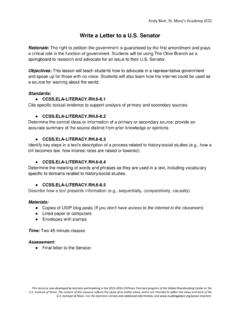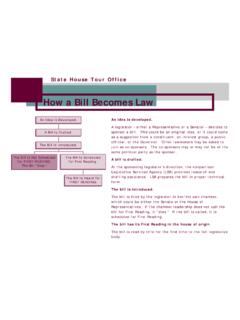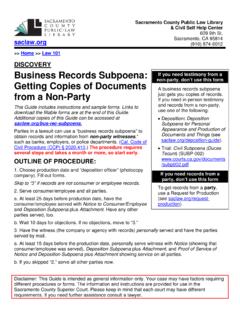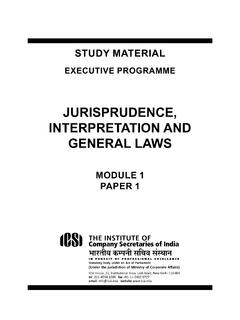Transcription of EXECUTIVE PROGRAMME - ICSI
1 ISTUDY MATERIALEXECUTIVE PROGRAMMEJURISPRUDENCE, INTERPRETATION AND GENERAL LAWSMODULE 1 PAPER 1ii THE INSTITUTE OF COMPANY SECRETARIES OF INDIATIMING OF HEADQUARTERSM onday to FridayOffice Timings to Dealing TimingsWithout financial transactions to financial transactions to Typesetting by AArushi Graphics, Prashant Vihar, New Delhi, and Printed at H T Media/October 2020iiiiiEXECUTIVE PROGRAMMEJURISPRUDENCE, INTERPRETATION AND GENERAL LAWSThis paper consists of three components, namely Jurisprudence, Interpretation and General Laws. Jurisprudence is the study of the science of law. The study of law in jurisprudence is not about any particular statute or a rule but of law in general, its concepts, its principles and the philosophies underpinning primary object of the interpretation is to discover the true intention of the Legislature.
2 The necessity of interpretation arises where the language of a statutory provision is ambiguous, not clear or where two views are possible or where the provision gives a different meaning defeating the object of the General Laws is an important pre-requisite for professional course like Company Secretary. Constitutional Law that deals with powers, functions and responsibilities of various organs of the State; Administrative law deals with day to day governance mechanism and Civil and Criminal Procedure Code, Right to Information Act, 2005 etc., spreads into approximately every phase of modern objective of this Study Material enable the students to understand and acquire working knowledge of Jurisprudence, Interpretation and General Laws.
3 After studying this study material the student will be able to analyse principles underlying the legal postulates and propositions, and connection between theory of law and study material has been published to aid the students in preparing for the Jurisprudence, Interpretation and General Laws paper of the CS EXECUTIVE PROGRAMME . It is part of the educational kit and takes the students step by step through each phase of preparation emphasizing key concepts, principles, pointers and procedures. Company Secretaryship being a professional course, the examination standards are set very high, with focus on knowledge of concepts, their application, procedures and case laws, for which sole reliance on the contents of this study material may not be enough. This study material may, therefore, be regarded as the basic material and must be read alongwith the Bare Acts, Rules, Regulations, Case subject of Jurisprudence, Interpretation and General Laws is inherently fundamental to evolution and refinement of legislations, rules and regulations.
4 It, therefore becomes necessary for every student to constantly update with legislative changes made as well as judicial pronouncements rendered from time to time by referring to the Institute s monthly journal Chartered Secretary and e-bulletin Student Company Secretary as well as other law/professional journals and reference Legislative changes made upto June, 2020, have been incorporated in the study material. Besides, as per the Company Secretaries Regulations, 1982, students are expected to be conversant with the amendments to the laws made upto six months preceding the date of examination. In the event of any doubt, students may write to the Directorate of Professional Development, Perspective Planning & Studies of the Institute for clarification at due care has been taken in publishing this study material, the possibility of errors, omissions and/or discrepancies cannot be ruled out.
5 This publication is released with an understanding that the Institute shall not be responsible for any errors, omissions and/or discrepancies or any action taken in that there be any discrepancy, error or omission noted in the study material, the Institute shall be obliged if the same is brought to its notice for issue of corrigendum in the e-bulletin Student Company Secretary .ivEXECUTIVE PROGRAMME Module 1 Paper 1 JURISPRUDENCE, INTERPRETATION AND GENERAL LAWS (Max Marks 100)SYLLABUSO bjectivesTo provide understanding and working knowledge of sources of law, Constitution, legislative environment, interpretation of statutes and general Contents 1. Sources of Law: Meaning of Law and its Significance; Relevance of Law to Civil Society; Jurisprudence & Legal Theory; Schools of Law propounded by Austin, Dean Roscoe Pound, Salmond, Kelsen and Bentham; Statutes, Subordinate Legislation, Custom, Common Law, Precedent, Stare decisis.
6 2. Constitution of India: Broad Framework of the Constitution of India; Fundamental Rights, Directive Principles of State Policy and Fundamental Duties; Legislative framework and Powers of Union and States; Judicial framework; EXECUTIVE /Administrative framework; Legislative Process; Money Bill; Finance Bill and Other Bills; Parliamentary Standing Committees and their Role; Writ Jurisdiction of High Courts and the Supreme Court; Different types of writs. 3. Interpretation of Statutes: Need for interpretation of a statute; Principles of Interpretation; Aids to Interpretation; Legal Terminologies; Reading a Bare Act & Citation of Cases. 4. General Clauses Act, 1897: Key Definitions; General Rule of Construction; Retrospective Amendments; Powers and Functions; Power as to Orders, Rules etc.
7 , made under Enactments. 5. Administrative Laws: Conceptual Analysis; Source and Need of Administrative Law; Principle of Natural Justice; Administrative Discretion; Judicial Review & Other Remedies; Liability of Government, Public Corporation. 6. Law of Torts: General conditions of Liability for a Tort; Strict and Absolute Liability; Vicarious Liability; Torts or wrongs to personal safety and freedom; Liability of a Corporate Entity/Company in Torts; Remedies in Torts. 7. Limitation Act, 1963: Computation of the Period of Limitation; Bar of Limitation; Effect of acknowledgment; Acquisition of ownership by Possession; Classification of Period of Limitation. 8. Civil Procedure Code, 1908: Structure and Jurisdiction of Civil Courts; Basic Understanding of Certain Terms - Order, Judgment and Decree, Stay of Suits, Cause of Action, Res Judicata, Summary Proceedings, Appeals, Reference, Review and Revision; Powers of Civil Court and their exercise by Tribunals; Institution of Suit; Summary 9.
8 Indian Penal Code, 1860: Introduction; Offences against Property-Criminal Misappropriation of Property, Criminal Breach of Trust, Cheating, Fraudulent Deeds and Dispositions of Property; Offences relating to Documents and Property Marks- Forgery; Defamation; Abetment and Criminal Conspiracy. 10. Criminal Procedure Code, 1973: Classes of Criminal Courts; Power of Courts; Arrest of Persons; Mens Rea; Cognizable and Non-Cognizable Offences; Bail; Continuing Offences; Compounding of Offences; Summons and Warrants; Searches; Summary Trial. 11. Indian Evidence Act, 1872: Statements about the facts to be proved; Relevancy of facts connected with the fact to be proved; Opinion of Third Persons ; Facts of which evidence cannot be given; Oral, Documentary and Circumstantial Evidence; Burden of proof; Presumptions; Estoppel; Witness; Improper admission & rejection of evidence.
9 12. Special Courts, Tribunals under Companies Act & Other Legislations: Constitution; Powers of Tribunals; Procedure before Tribunals; Powers of Special Courts; Power to punish for contempt; Overview of NCLT Rules; Quasi-Judicial Authorities. 13. Arbitration and Conciliation Act, 1996: Arbitration Law in India; Appointment of Arbitrators; Judicial Intervention; Award; Recourse against Award; Conciliation and Mediation. 14. Indian Stamp Act, 1899: Key Definitions; Principles of Levy of Stamp Duty; Determination, Mode and timing of Stamp Duty; Person responsible; Consequences of Non-Stamping and Under-Stamping; Adjudication; Allowance and Refund ; Concept of E-Stamping. 15. Registration Act, 1908: Registration of Documents: Compulsory, Optional; Time and Place of Registration; Consequences of Non-Registration; Prerequisites for Registration.
10 16. Right to Information Act, 2005: Key Definitions; Public Authorities & their Obligations; Role of Central/State Governments; Central Information Commission; State information Commission. 17. Information Technology Act, 2000 : Introduction, definition, important terms under the Act; Digital Signatures, Electronic Record, Certifying Authority, Digital Signature Certificate; Cyber Regulation Appellate Tribunal; Offences and Penalties; Rules relating to sensitive personal data under IT Laws, Case Studies & Practical AspectsviLESSON WISE SUMMARYJURISPRUDENCE, INTERPRETATION AND GENERAL LAWSL esson 1 - Sources of LawLaw is not static. As circumstances and conditions in a society change, laws are also changed to fit the requirements of society. At any given point of time the prevailing law of a society must be in conformity with the general statements, customs and aspirations of its people.



